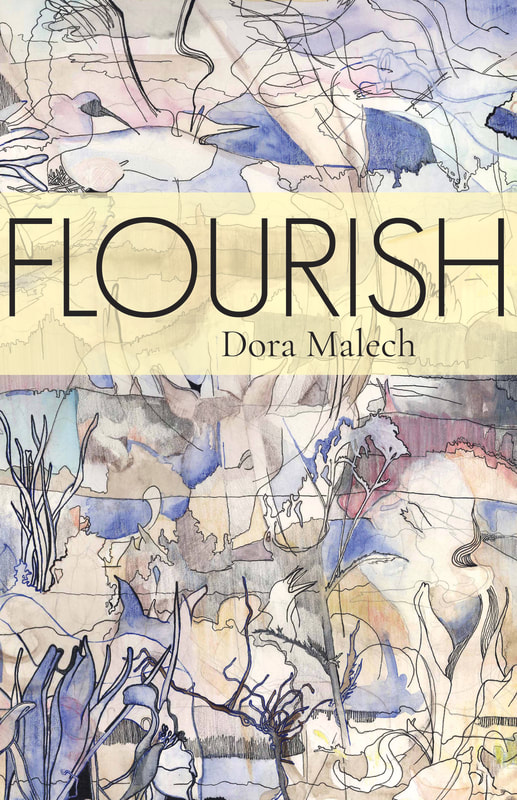 Even at its most intense, Blackford’s poetry never stops being warm, accessible and humorous. The Alpaca Cantos is beautifully presented with thick paper, careful layouts, with lovely drawings by artist Gwynneth Jones. These are poems that are both complex and simple, tragic and yet infused with delight and an almost impish joy in the day-to-day.
Even at its most intense, Blackford’s poetry never stops being warm, accessible and humorous. The Alpaca Cantos is beautifully presented with thick paper, careful layouts, with lovely drawings by artist Gwynneth Jones. These are poems that are both complex and simple, tragic and yet infused with delight and an almost impish joy in the day-to-day.
Author:
A review of Flourish by Dora Malech
 As in Bishop’s works, Malech seems to present some of her poems in utter simplicity, then surprises with the unexpected turn at the end. “Dear Reader” (p. 67) does this quite successfully. Some of the poems appear enigmatic, but when studied, reveal a coherent whimsy. “Come Again” (p.55) plays on the comedy of typos and “Euscorpius italicus” ( p.37) on the fear of spiders, both done with commendable control.
As in Bishop’s works, Malech seems to present some of her poems in utter simplicity, then surprises with the unexpected turn at the end. “Dear Reader” (p. 67) does this quite successfully. Some of the poems appear enigmatic, but when studied, reveal a coherent whimsy. “Come Again” (p.55) plays on the comedy of typos and “Euscorpius italicus” ( p.37) on the fear of spiders, both done with commendable control.
An interview with R.W.R McDonald
 The author of The Nancys talks about his lifelong passion for Nancy Drew, his inspirations, working with top-notch editors, his novel writing workshop at Faber, world building, and lots more.
The author of The Nancys talks about his lifelong passion for Nancy Drew, his inspirations, working with top-notch editors, his novel writing workshop at Faber, world building, and lots more.
A review of Tricks of Light by Thaddeus Rutkowski
 Rutkowski ruminates on so many of the little things that usually escape notice. Three poems are devoted to a pet turtle. Imagine that, a turtle, the very definition of a slow-moving, boring thing. Yet in poems like “Turtle’s Cold Day,” we see Rutkowski actually worrying about the animal because of subtle anomalies in her behavior. In “Head Scratching” he observes that he knows why she stretches her legs – “to cool off.” But he’s puzzled by the reason behind her scratching her head. Could it be a mosquito?
Rutkowski ruminates on so many of the little things that usually escape notice. Three poems are devoted to a pet turtle. Imagine that, a turtle, the very definition of a slow-moving, boring thing. Yet in poems like “Turtle’s Cold Day,” we see Rutkowski actually worrying about the animal because of subtle anomalies in her behavior. In “Head Scratching” he observes that he knows why she stretches her legs – “to cool off.” But he’s puzzled by the reason behind her scratching her head. Could it be a mosquito?
A review of Figuring by Maria Popova
 Emily Dickinson, in particular, comes across with such a delicacy and radiance that we begin to understand and sympathise with the odd recluse whose great love lasts a lifetime, and whose poetic work has not only been the beginnings of the modernist movement in poetry, but also an ongoing inspiration.
Emily Dickinson, in particular, comes across with such a delicacy and radiance that we begin to understand and sympathise with the odd recluse whose great love lasts a lifetime, and whose poetic work has not only been the beginnings of the modernist movement in poetry, but also an ongoing inspiration.
A review of Million Dollar Red By Gleah Powers
 Million Dollar Red provides great insight into the point of view of a child who survives childhood traumas to finally make a sustainable life for herself. It would be a great book to be read in community work-focused classrooms for those who seek to be trauma-informed as they make a difference with today’s youth.
Million Dollar Red provides great insight into the point of view of a child who survives childhood traumas to finally make a sustainable life for herself. It would be a great book to be read in community work-focused classrooms for those who seek to be trauma-informed as they make a difference with today’s youth.
A review of The Wondrous Apothecary by Mary E Martin
 In addition to writing a solid storyline for her Trilogy of Remembrance, she also demonstrates a rather thorough background in the visual arts and gracefully weaves that important historical stance into her story in a most mature and sophisticated manner. These are novels that will please a broad audience – those who love romance novels and those who want to explore the universal discussion of what is art at this particular time in history.
In addition to writing a solid storyline for her Trilogy of Remembrance, she also demonstrates a rather thorough background in the visual arts and gracefully weaves that important historical stance into her story in a most mature and sophisticated manner. These are novels that will please a broad audience – those who love romance novels and those who want to explore the universal discussion of what is art at this particular time in history.
A review of Girls Like Us by Elizabeth Hazen
 So many of these poems are littered with broken hearts and relationships gone sour, feelings of foreboding and loneliness and vulnerability. The second reference to “girls like us” comes in “Diagnosis III,” which highlights the incipient violence lurking everywhere. It begins: “Girls like you, he spat, / his breath laden with smoke / and Svedka….” It ends: “Girls like / you, he repeated, leaving me / a blank to fill.”
So many of these poems are littered with broken hearts and relationships gone sour, feelings of foreboding and loneliness and vulnerability. The second reference to “girls like us” comes in “Diagnosis III,” which highlights the incipient violence lurking everywhere. It begins: “Girls like you, he spat, / his breath laden with smoke / and Svedka….” It ends: “Girls like / you, he repeated, leaving me / a blank to fill.”
A review of Ghosts of the Shadow Market by Cassandra Clare
 I would highly, highly encourage you to read the previous books in the Shadowhunter Chronicles. Ghosts of Shadow Market had me in hysterics, tears and laughter all at once. I found it to be absolute perfection. For this book, and for all of the other Shadowhunter novels, I think the best suited age group would be 14+. I believe the time you read certain books or series influences your opinion and I delved into the fantasy world of Shadowhunters, demons and Downworlders at perhaps the perfect time.
I would highly, highly encourage you to read the previous books in the Shadowhunter Chronicles. Ghosts of Shadow Market had me in hysterics, tears and laughter all at once. I found it to be absolute perfection. For this book, and for all of the other Shadowhunter novels, I think the best suited age group would be 14+. I believe the time you read certain books or series influences your opinion and I delved into the fantasy world of Shadowhunters, demons and Downworlders at perhaps the perfect time.
An interview with Jerry Yudelson
 Jerry Yudelson, author of The Godfather of Green: An Eco-Spiritual Memoir, released on Earth Day 2020 by Wyatt-MacKenzie Publishing, talks about the way his book combines environmental work and spiritual discovery, and why he thinks that the climate crisis should be tackled the same way as earlier social and environmental crises.
Jerry Yudelson, author of The Godfather of Green: An Eco-Spiritual Memoir, released on Earth Day 2020 by Wyatt-MacKenzie Publishing, talks about the way his book combines environmental work and spiritual discovery, and why he thinks that the climate crisis should be tackled the same way as earlier social and environmental crises.